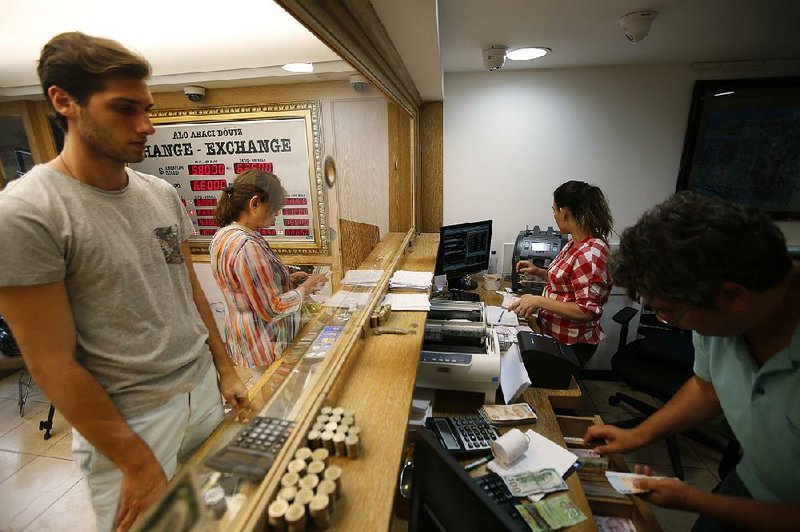President Donald Trump's administration assailed retaliatory tariffs imposed by Turkey on about $533 million of U.S. goods as the standoff between the two NATO allies over the detention of an American pastor worsened.
The new tariffs are "regrettable" and "a step in the wrong direction," White House press secretary Sarah Sanders told reporters Wednesday.
Turkey said Wednesday that it is increasing tariffs on some U.S. products like cars, alcohol, and coal -- a move that is unlikely to have much economic impact but highlights the deteriorating relations with the U.S. in a feud that has already helped trigger a currency crisis.
Turkey's new tariffs follow President Recep Tayyip Erdogan's call on Tuesday for a boycott of U.S. electronics including Apple Inc.'s iPhones to retaliate for the Trump administration's punitive actions over the past few weeks to pressure Turkey into releasing a Christian minister, Andrew Brunson.
On Wednesday, a court rejected an appeal for Brunson's release from detention and for a travel ban against him to be lifted, the state-run Anadolu Agency reported. A higher court however, was scheduled to review the appeal, the agency said.
Although he was released to home detention, Brunson faces a prison sentence of up to 35 years if he is convicted on both counts at the end of his ongoing trial.
The pastor has lived in Turkey for 23 years and led Izmir Resurrection Church.
Tensions between the two nations has sent the Turkish lira to record lows and has weighed on global financial markets.
Sanders said the Trump administration "would consider" lifting sanctions imposed on the chiefs of Turkey's Justice Ministry and Interior Ministry for their roles in the detention of the pastor once he is released.
Sanders said that even if Erdogan releases the U.S. clergyman, the additional tariffs on Turkish steel and aluminum won't be lifted because they are based on "national security." Trump cited national security in announcing the tariffs earlier this year, then doubled the levies for Turkish metals during his clash with Erdogan.
The Turkish government said tariffs on American cars will be doubled to 120 percent while those on alcoholic drinks will be increased by the same rate to 140 percent. Overall, the duties will amount to $533 million, a relatively small sum meant as retaliation for Trump's doubling of tariffs on Turkish steel and aluminum.
Beyond the bluster of the two world leaders, the spat between the NATO allies has exacerbated a financial storm in Turkey. International investors have been put off by the country's high levels of foreign debt and Erdogan's refusal to allow the central bank to raise interest rates to support the currency, as experts say it should.
The currency drop is particularly painful for Turkey because it has accumulated a high debt in foreign currencies.
The Turkish lira has dropped to a series of record lows in recent weeks, having fallen 37 percent so far this year. It recovered a bit, by 5 percent to around 6.05 lira per dollar Wednesday, after the government took steps to shore up the currency by reducing the daily limit in bank foreign-currency swap transactions.
On Wednesday, Turkish officials said Qatar had pledged $15 billion of direct investments for Turkey, in a bid to help Turkey's economy. The officials said Qatar's Sheikh Tamin bin Hamad Al Thani pledged to "quickly implement" the investment package during a meeting with Erdogan in Ankara. The officials from Erdogan's office provided the information on condition of anonymity in line with regulations.
Also helping the Turkish currency were moves by Turkey to gain favor with European countries.
It decided to release two Greek soldiers from prison on Tuesday. On Wednesday, Turkey then freed Amnesty International's honorary chairman for Turkey, Taner Kilic, from prison pending the outcome of his trial on terror charges. And Erdogan held a phone call with German Chancellor Angela Merkel and planned to speak this week also with France's Emmanuel Macron.
Attention will turn today to an address by the finance minister to foreign investors for clues on any change in economic policy.
Investors are looking for substantive economic policy changes by Erdogan -- namely the acceptance of higher interest rates -- whereas the president has so far reacted mainly by blaming foreign powers, particularly the United States, which he says is waging an "economic war.
Over 20 American citizens, including Brunson, and three Turkish employees of the U.S. diplomatic mission in Turkey have been detained over the past two years.
The Americans have been prosecuted mostly on terrorism charges under the state of emergency imposed after a failed coup in July 2016. All but Brunson are Turkish-Americans, and, under Turkish law, they are treated as Turkish citizens, which makes it more difficult for U.S. authorities to advocate on their behalf.
Information for this article was contributed by Justin Sink of Bloomberg News; by Suzan Fraser of The Associated Press; and by Carlotta Gall of The New York Times.
Business on 08/16/2018

